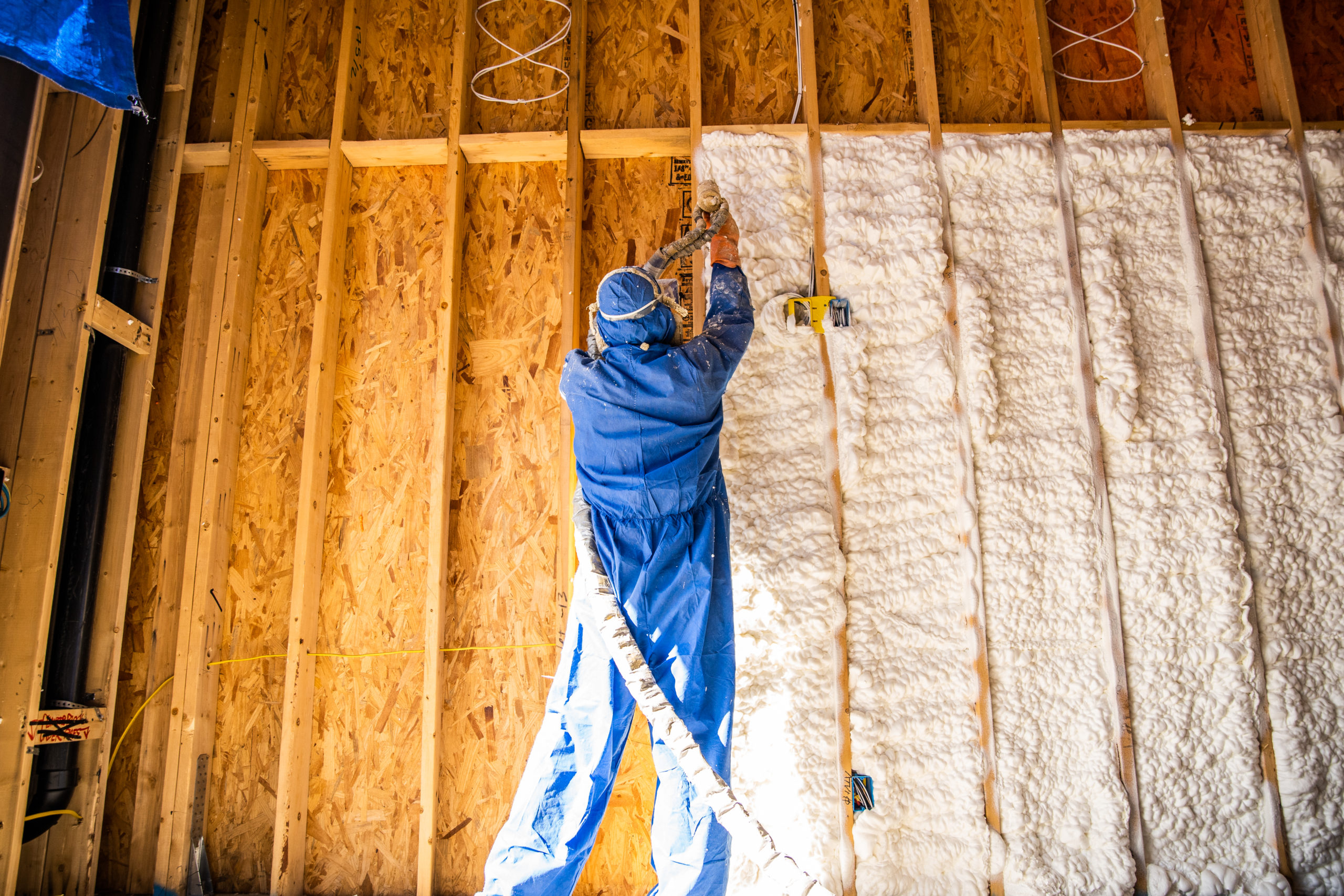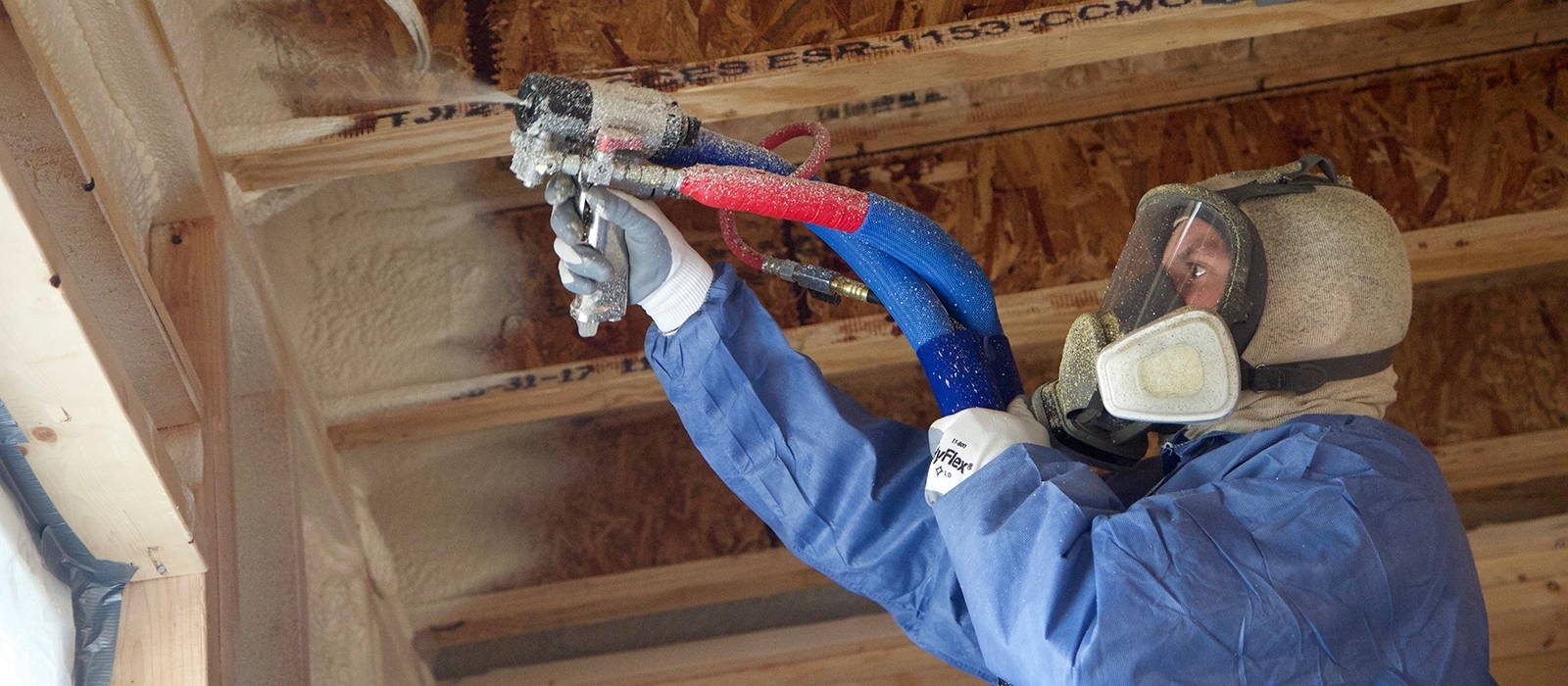The Process of Applying Spray Foam: What You Required to Know
The Process of Applying Spray Foam: What You Required to Know
Blog Article
Just How Spray Foam Can Enhance Energy Effectiveness in Any Kind Of Building
Spray foam insulation has become a critical service for improving energy effectiveness throughout various structure types. By creating a closed seal that decreases air leak, it efficiently regulates interior climates while substantially reducing heating and cooling prices. In addition, its outstanding R-value and moisture-resistant residential or commercial properties add to long-lasting power financial savings and boosted structure durability. As home proprietors significantly seek lasting remedies, the effects of spray foam insulation expand beyond plain energy cost savings. The complete range of its advantages, nonetheless, warrants a more detailed exam of exactly how it can change power monitoring methods in both business and domestic settings.
Understanding Spray Foam Insulation
Spray foam insulation is significantly recognized for its exceptional thermal performance and versatility in different applications. Made up primarily of polyurethane, this insulation material is used as a liquid that expands upon get in touch with, filling up voids and developing a smooth barrier. This special home permits spray foam to comply with irregular surface areas, making it an ideal choice for both household and business frameworks.

Application of spray foam insulation is typically executed by trained experts utilizing specific tools, guaranteeing optimum efficiency and safety - Spray Foam. The treating procedure is quick, permitting for quick setup and minimal interruption. Therefore, spray foam insulation is increasingly being utilized in brand-new building and retrofitting jobs because of its capacity to boost structural integrity while boosting general power efficiency in structures
Advantages of Power Efficiency
Power efficiency plays an essential function in minimizing operational expenses and decreasing environmental effect across different fields. By maximizing energy usage, companies and home owners can accomplish significant financial savings on energy costs, which directly boosts economic performance. Effective energy intake suggests less reliance on fossil fuels, consequently adding to a reduction in greenhouse gas emissions and advertising a more sustainable setting.
Additionally, energy-efficient buildings usually experience enhanced home values. As power expenses rise and sustainability becomes a priority for consumers, homes with enhanced power performance functions are extra appealing on the market. This pattern urges investment in energy-saving innovations, which can further drive advancement and economic development.
Along with environmental and monetary advantages, energy effectiveness can likewise enhance the total convenience and wellness of indoor spaces. Proper insulation and efficient home heating and cooling systems assist keep constant temperature levels, reducing drafts and humidity levels, which in turn can result in better indoor air high quality.
Ultimately, the advantages of energy performance prolong beyond instant financial savings, promoting a durable economic climate, promoting environmental stewardship, and improving the quality of life for residents in any kind of structure.
Just How Spray Foam Functions
Normally used as a liquid, spray foam expands quickly upon call with surfaces, developing a solid obstacle that efficiently secures fractures and gaps. This unique residential or commercial property results from its chemical make-up, largely consisting of isocyanates and polyols, which respond when blended to develop a foam that fills up gaps and sticks to various products, consisting of wood, concrete, and metal.
As soon as used, the foam expands to numerous times its original quantity, ensuring a limited seal that avoids air leak. This procedure dramatically decreases thermal bridging, which occurs when warmth transfers with products, bring about power loss. The foam's high R-value, a measure of thermal resistance, adds to improved insulation by lessening warm transfer between the exterior and interior atmospheres.
Furthermore, spray foam is resistant to dampness and bugs, even more improving its effectiveness in keeping energy efficiency. Its application can be customized to various areas, consisting of attics, walls, and crawl rooms, maximizing insulation across a building. Spray Foam. Generally, the ingenious layout and application technique of spray foam make it a reliable service for boosting energy effectiveness in any kind of framework, resulting in decreased energy prices and a more sustainable built setting

Applications in Various Structures
Many applications of spray foam insulation can be discovered throughout numerous structure types, improving energy performance and comfort. In domestic homes, spray foam is commonly used in attics and wall surfaces to develop a seamless barrier versus air leaks, significantly minimizing heating and cooling down needs. This application is particularly helpful in older homes, where typical insulation may be inadequate.
In industrial buildings, spray foam insulation is used to roof covering systems and exterior wall surfaces, which assists to boost thermal performance and protect versus moisture breach. Its lightweight nature makes it an excellent option for retrofitting existing structures without adding substantial weight. Additionally, spray foam can be used in industrial setups to protect pipelines and storage space tanks, keeping temperature level control for sensitive products.
Institutional buildings, such as colleges and health centers, advantage from spray foam insulation by ensuring a consistent interior environment that sustains passenger comfort and health and wellness. The versatility of spray foam enables it to adjust to numerous building sizes and shapes, making it a recommended option for designers and contractors seeking efficient insulation services. Overall, spray foam insulation works as an important component in achieving energy-efficient buildings throughout all markets.
Long-Term Cost Cost Savings
Spray foam insulation offers significant long-lasting price financial savings for structure proprietors and residents by minimizing power intake and lowering utility bills. By offering a superior air seal, spray foam minimizes the seepage of outside air, consequently boosting the thermal efficiency of a building. This results in extra effective heating and cooling down procedures, which can bring about significant reductions in power expenses in time.
Along with prompt financial savings on energy expenses, the durability and long life of spray foam insulation add to its economic advantages. Unlike traditional insulation materials, which may sag, clear up, or wear away, spray foam maintains its effectiveness for years, reducing the need for constant replacements or repairs. This longevity converts to decrease maintenance costs and less disruption for owners.
Furthermore, structures equipped with spray foam insulation usually enjoy a rise in building value, making them more attractive to potential customers or occupants. see here now As power effectiveness becomes significantly prioritized, his comment is here properties with effective insulation solutions stand out in the market. Inevitably, the combination of spray foam insulation not only enhances comfort however likewise stands for a calculated investment that generates significant financial advantages over the long-term.
Conclusion
Finally, spray foam insulation serves as a vital component in improving energy effectiveness across diverse building kinds. Its capacity to create a seamless barrier versus air leak, incorporated with moisture-resistant properties and high r-values, substantially reduces energy consumption and linked expenses. The application of spray foam not only contributes to constant indoor temperatures however likewise raises building value, highlighting its duty as a prudent financial investment for both domestic and commercial residential or commercial properties.
Spray foam insulation has actually arised as a crucial remedy for enhancing energy performance across different structure kinds. Spray Foam. As an outcome, spray foam insulation is increasingly being used in brand-new construction and retrofitting tasks due to its ability to boost architectural integrity while enhancing overall energy performance in buildings
Generally, the innovative design and application approach of spray foam make it a reliable option for improving power performance in any structure, leading to minimized energy prices and an extra sustainable constructed setting.
Various applications of spray foam insulation can be discovered throughout numerous building types, improving power effectiveness next page and comfort.In final thought, spray foam insulation serves as an essential part in improving power effectiveness across varied building types.
Report this page